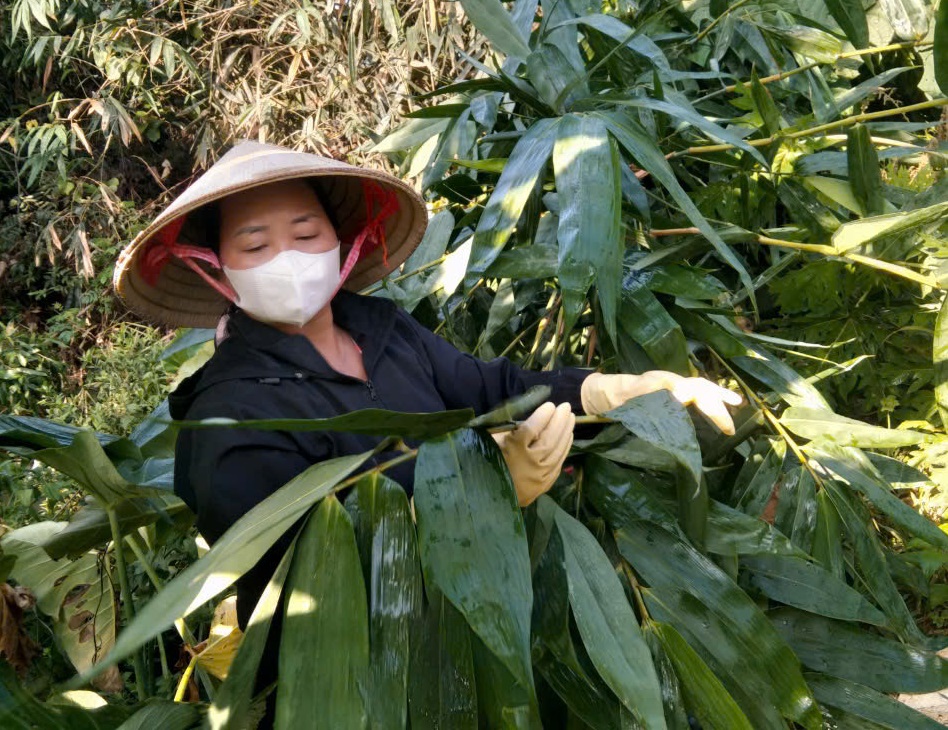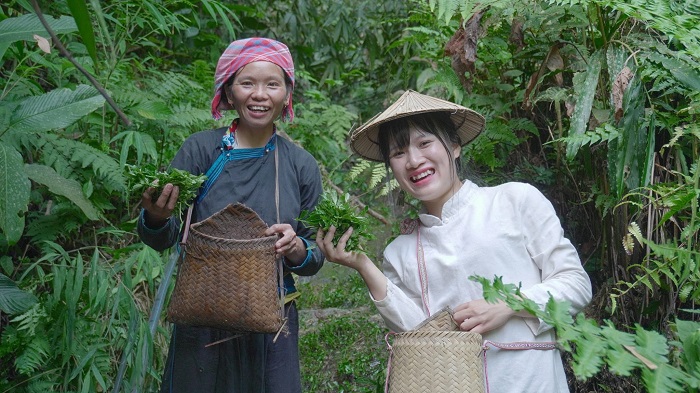In the process of digital transformation, some businesses have "inadvertently" created new environmentally-friendly products that provide jobs for marginalized communities.

(Mrs. Vi Thi Sang, Member of Tan Xuan 269 Cooperative, harvesting bamboo leaves)
Over the past four years, *We have had the opportunity to support and accompany many small businesses and ethnic minority cooperatives in Son La and Lao Cai to "digitally transform" for sustainable development within the framework of the GREAT project funded by the Australian Government.
Digital transformation, from our perspective, is not an abstract or distant concept. When discussing with business owners, we explain that it's about leveraging the internet to sell better, easier, and with greater impact. This process is not simply about applying technology, but more importantly, about creating new products, new markets, new methods, and above all, a fresh mindset.
We anticipate sharing the fascinating stories we've experienced. These stories might potentially inspire similar business support policies and motivate companies at any level and scale.
Which Products Are Suitable for Online Sales?
Actually, any product can be sold online (not just on e-commerce platforms, but also websites and social media), but typically, businesses lack confidence in raw products. The reasons include complex preservation, transportation, storage, and packaging processes, with high wastage rates. Moreover, online competition is even more fierce than traditional markets, with an overwhelming variety of products.
To best benefit from internet sales, businesses should create processed products with long shelf lives, minimal maintenance requirements, and easy transportation. The products themselves should have unique characteristics to stand out from the crowd and capture user attention.
Not Afraid to Experiment with New Products
We had the opportunity to support Tan Xuan 269 Cooperative in Son La to develop a new online product. Previously, they had been successful selling dried bamboo shoots in traditional markets and on social media and e-commerce platforms. "Bamboo shoots sell out from the moment we start production," shared Mrs. Cao Thi Tam, the cooperative's manager.
However, bamboo shoots are seasonal, and with just this product, despite its popularity, they couldn't help all cooperative members escape poverty. Therefore, finding a new product to increase revenue was their constant need. We suggested they process bamboo leaf tea. This was an emerging product in the market, proving its feasibility, with relatively low competition, as only a few businesses in the south produced "bamboo leaf water".
Moreover, this beverage is quite familiar to people in Lao Cai, who traditionally steep bamboo leaves in bamboo tubes while in the forest. The idea was quickly embraced, and it took just three weeks to launch the product. Currently, many people are interested in ordering bamboo leaf tea on social media, with plans for wider distribution.
Another story involves Homestay Ban Liens Forest, a family business in Bac Ha, Lao Cai, famous for Shan Snow Tea grown at 1800m altitude. Their tea, with a beautiful green color and sweet, fragrant taste, is exported to 40 countries, including demanding markets like Europe and the US.
Ban Liens Forest primarily offers tourism services and promotes them on social media, attracting many tourists. However, tourism has its "seasons", and outside peak times, they also harvest and sell tea. The challenge was how to "compete" with dozens or hundreds of local households selling similar products, even online.
We discovered that mature tea leaves are also sold piecemeal on e-commerce platforms, unlike the traditional young tea buds processed by Ban Liens. We shared this insight with the homestay owners, who quickly agreed. Vang Thi Thong, a homestay member, even expressed interest in finding technology to remove bitterness from tea leaves. Now they have a new product: dried mature tea leaves, to be consumed in the Japanese Bancha style.
The journey from idea to a marketable product happened quickly, partly thanks to "digital transformation" or, more broadly, the internet. Both businesses were already "present" on social media through Facebook fan pages with an established audience.
Social media reduces market entry barriers, allowing them to explore markets and diversify products. Whenever they have a new product or idea, they can quickly test user reactions by introducing products and engaging with customers online.

(Ban Lien Forest introduces its homestay experience on social media)
Bamboo leaf tea and mature tea leaves – two "non-traditional" products compared to their previous offerings – would typically require significant time and effort to promote and convince customers if sold directly. However, online sales enable them to quickly share with existing customers and find potential new ones with just a few clicks.
This process inevitably requires them to adjust their communication and sales approach to suit new customers, gradually transforming their business model without significant costs, and with the ability to fail quickly and painlessly.
As similar products emerge in the market, these businesses now have a loyal customer base. They continue leveraging the internet to experiment with new ideas. In fact, after launching mature tea leaf products, a Ban Liens Forest member posted about tea flowers online and immediately received purchase orders. The Tan Xuan Cooperative is also introducing dried ginger products online.
Accidentally Turning Green
Neither Tan Xuan 269 Cooperative nor Ban Liens Forest Homestay initially planned their current products. Tan Xuan 269 only harvested bamboo shoots, leaving bamboo leaves unused. Ban Liens people only harvested young tea buds for green tea, discarding bitter mature leaves. Now, these agricultural by-products have been transformed into new product lines.
The bamboo leaf tea maintains its distinctive fragrance, beautiful green color, and is believed to offer health benefits like heat relief and respiratory treatment.
"Everyone in the community likes the product. People even stayed up all night to complete and send out new product samples. We've already received orders. In the future, with this technology, we're experimenting with new products to sell not just locally, but to leverage e-commerce for nationwide and potentially international sales," Mrs. Cao Thi Tam said.
Regarding mature tea leaf products, Mr. Lam A Nang from Ban Liens Forest Homestay shared, "It has a good taste, isn't bitter, and has potential for application in new products to sell to tourists, on e-commerce platforms, and our own fan page."
It's worth noting that these new products emerged not just from the businesses themselves but through our connection with scientists. Mr. Tran Chi Thanh, founder of Sac Moc Tinh Company, transferred chlorophyll-defining technology to these two businesses at a preferential rate, preserving the green color while removing the bitter taste.
The success stories of Tan Xuan 269 Cooperative and Lao Cai businesses demonstrate the effectiveness of expanding business capabilities and experimenting with new models. Utilizing agricultural by-products not only reduces waste but also helps build sustainable value chains, bringing economic and social benefits. Processes like harvesting, sorting, processing, and packaging create jobs for local labor, particularly suitable for women, people with disabilities, and unskilled workers. This represents a significant step in using digital transformation to promote gender equality and social inclusion.
By Luu Trong Hieu - Nguyen Viet Dung*
Project Assistants, Digital Business Acceleration Program (IDAP) for Businesses, Cooperatives, and Individual Businesses at KisStartup



